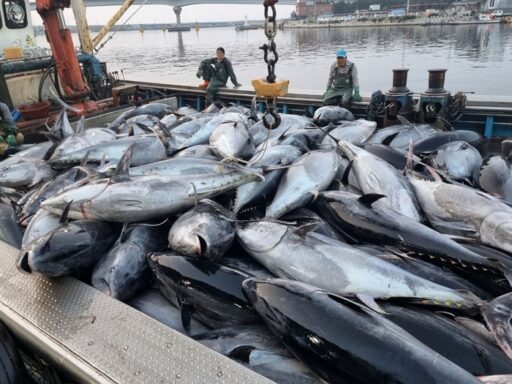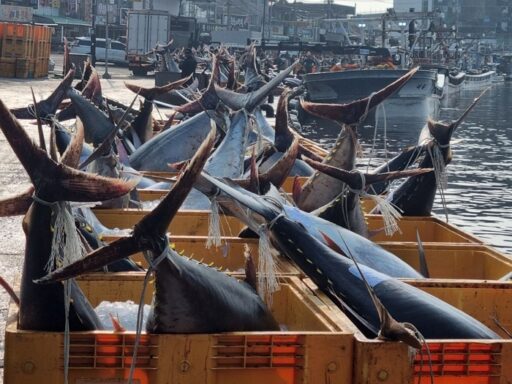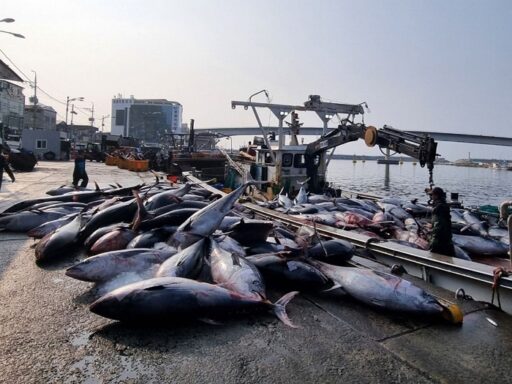Large-scale Catch of Over 1,300 Giant Yellowfin Tuna Weighing Over 100kg on the East Coast of Gyeongbuk
A historic catch has been recorded on the East Coast of Gyeongbuk. According to the Yeongdeok County and Ganggu Fisheries Cooperative on the 8th, more than 1,300 giant yellowfin tunas, measuring 1 to 1.5 meters in length and weighing between 130 to 150kg, were caught all at once in the waters off Ganggu-myeon in Yeongdeok on that morning.
This is the first time that such a large number of giant tuna has been caught simultaneously on the East Coast, drawing attention from the fishing industry. However, it is unfortunate news that all of them are to be discarded.

These yellowfin tunas, caught at the border between Yeongdeok and Pohang, were delivered to the Ganggu and Pohang Fisheries Cooperatives, with 700 and 600 fish, respectively.
In particular, on the 6th, 70 yellowfin tunas weighing between 130 to 160kg were also caught in Yeongdeok, which has led to sensational news due to the consecutive large catches.
The large catch of yellowfin tuna will be auctioned at a low price but is expected to be discarded entirely.
The yellowfin tunas caught this time were auctioned for 2,500 won per kg at the Ganggu Fisheries Cooperative. This is extremely low compared to a yellowfin tuna weighing 314kg, which was sold for 10.5 million won on February 11.
Generally, yellowfin tuna that maintains good freshness trades for 30,000 to 35,000 won per kg.
A representative from the Ganggu Fisheries Cooperative explained, "Unlike long-range fishing vessels that stun fish with electric shocks before processing and freezing, the handling at the harbor took a long time, causing the product quality to diminish and leading to cheap sales. With 700 fish coming in this time, they piled up around the harbor like a mountain, creating quite a chaotic situation."

However, the bigger problem is that all the yellowfin tunas caught are expected to be discarded. This is because Korea has completely filled its tuna quota for the Gyeongbuk region as set by the Western and Central Pacific Fisheries Commission (WCPFC).
This year, Korea's total quota is 1,219 tons, with about 50% currently filled. The quota allocated for Yeongdeok and Pohang in the Gyeongbuk region is just 53 tons.
Need for Quota Adjustment Due to Species Changes Caused by Climate Change
Ship owner Shin An-ho (42) stated, "A few years ago, we caught large quantities of yellowfin tuna weighing about 10 to 15kg, but this is the first time we’ve caught so many large ones together. Although they could go for hundreds of thousands of won each, we have to throw them away without being able to sell them," expressing his disappointment.
He added, "While yellowfin tuna is referred to as the 'sea lotto' next to whales, from the fishermen's perspective, it actually results in a loss. We’ve essentially lost 500,000 won in fuel and crew wages."

The over 170 tons of yellowfin tuna caught that day will be used for livestock feed. Yellowfin tuna have the characteristic of suffocating if they stop swimming, which means they die the moment the nets are pulled up.
The yellowfin tuna caught after the quota is filled must be discarded into the sea. It has been pointed out that these discarded yellowfin tunas can wash ashore and decay, causing environmental pollution.
An official from Yeongdeok County analyzed, "It seems like the influx of preferred prey species such as mackerel, sardines, and Spanish mackerel, driven by climate change, has brought in the schools of tuna."
In fact, the catch of yellowfin tuna on the East Coast of Gyeongbuk, including Uljin, Yeongdeok, and Pohang, increased dramatically from 3.3 tons in 2020 to 164 tons last year—a 50-fold increase.
Professor Kim Hae-dong from the Department of Environmental Engineering at Keimyung University noted, "Last year, the seawater temperature on the South Coast rose to 30 degrees Celsius. The disappearance of seaweeds like kelp has created an environment where species like flatfish and rockfish cannot survive. Korea is essentially already in a subtropical zone."
Image source: News1

![[Breaking News] Jeong Cheong-rae elected as new leader of the Democratic Party… First ruling party head under Lee Jae-myung’s government](https://wordkorean.com/wp-content/uploads/2025/08/thumbnail-25.jpg)
